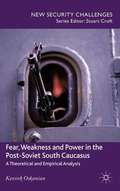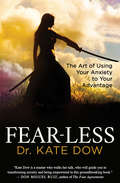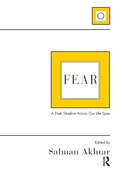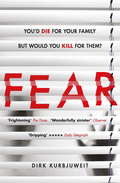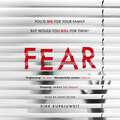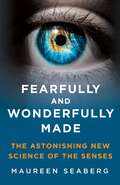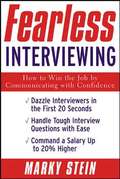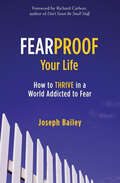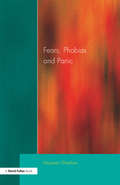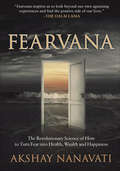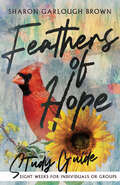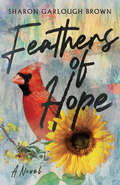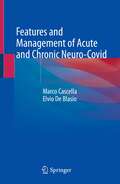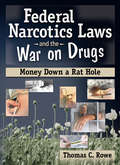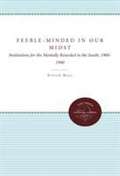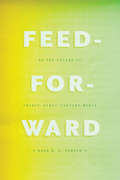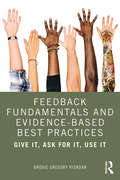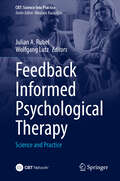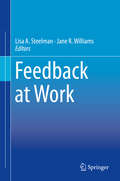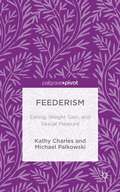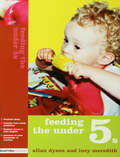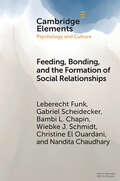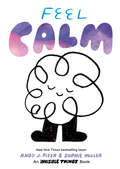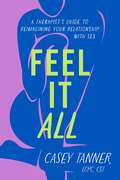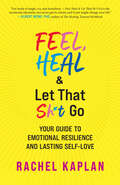- Table View
- List View
Fear, Weakness and Power in the Post-Soviet South Caucasus
by Kevork OskanianThis book provides a detailed, multi-level analysis of international security in the South Caucasus and considers whether this region of the former Soviet Union, with several as yet unresolved, 'frozen' separatist conflicts, can move towards a more peaceable future. Using three concepts from Regional Security Complex Theory, amity/enmity, state incoherence and great power penetration, Oskanian forms a unique conceptual expansion of the theory, providing a comprehensive examination of both material conditions and discourses of insecurity. Applying this expanded framework onto a region of considerable complexity and conflict, the book considers the hostility between the South Caucasian states, the fissures underlying their secessionist conflicts, and the regional involvement of great powers, outlining the broader narratives that pervade societies in Armenia, Azerbaijan and Georgia. The book also assesses the emergence of a security regime in the Southern Caucasus and offers a critical-prescriptive assessment of policy implications for both regional and extra-regional actors concerned with improved regional stability.
Fear-Less: The Art of Using Your Anxiety to Your Advantage
by Dr. Kate Dow&“Kate Dow is a master who walks her talk, who will guide you in transforming anxiety and being empowered&” (Don Miguel Ruiz, author of The Four Agreements). So many women and female entrepreneurs struggle with anxiety that is stopping them from moving forward in their personal growth, business, and sense of purpose. In Fear-Less, anxiety expert and coach Dr. Kate Dow offers proven methods for women to become adept at overcoming their anxiety and rewiring their brain. With compelling teachings, stories, and practices, she gently guides women back into relationship with their inner wisdom, abilities, and power. Fear-Less includes Dr. Kate Dow&’s narrative, as well as many client case stories of women&’s incredible outcomes. Written specifically for women from a unique and powerful perspective, Fear-Less guides readers through transformation with its practical, heart-based, and potent methods. If anxiety is getting in the way of your success—learn how to fear less.
Fear: A Dark Shadow Across Our Life Span
by Salman AkhtarBeginning with Freud's celebrated case of Little Hans, psychoanalysts and psychotherapists have been intrigued with the topic of fear. Eclipsed in theoretical writings by the term 'anxiety', fear remains a pervasive expression in day to day clinical work. Patients constantly talk about it. One implores that we cure him of his fear of dogs. Another offers the fear of aloneness as the rationale of her staying in a bad marriage. Yet another avoids all athletic activity due to the fear of physical injury. And a fourth one lives in utter denial of passing time to avoid facing his fear of death. Despite its ubiquitous presence, fear has received little direct attention in psychoanalytic literature. This book aims to fill this lacuna. It explicates various intensities of fear, e.g. apprehension, dread, panic, and terror. It delineates the boundaries between fear and anxiety and demonstrates how phobic states constitute an admixture of these two emotions.
Fear: A brilliantly gripping and twisty psychological thriller
by Dirk KurbjuweitThe Guardian, Daily Telegraph and Irish Times Book of the Year.'Something we've not seen before in contemporary crime fiction' GUARDIAN'[An] uncomfortably close-to-home thriller' SUNDAY TIMES CRIME CLUB'As intellectually stimulating as it is gripping' DAILY TELEGRAPH, BOOKS OF THE YEAR 2018'Takes you right into the heart of darkness' MAIL ON SUNDAY'A must-have new read' DAILY EXPRESS'Wonderfully sinister' THE OBSERVER'Frightening' THE TIMES'Addictive' INDEPENDENT'Terrific' JOANNE HARRIS'Brilliantly done' FIONA BARTON'A great achievement' HERMAN KOCH'Claustrophobic and unsettling' BBC NEWS'[A] creepy tale of obsession' SUNDAY MIRROR'An unsettling tale of merciless self-scrutiny' RENEE KNIGHT'A terrifying study of a family threatened by the tenant living downstairs' WOMAN & HOME*********How far would you go to protect your family?Family is everything. So what if yours was being terrorised by a neighbour - a man who doesn't listen to reason, whose actions become more erratic and sinister with each passing day?You go to the police, but they can't help you. You become afraid to leave your family at home alone. But there's nothing more you can do to protect them.Or is there...?FEAR is a brilliantly grippling, original psychological thriller - for fans of THE WOMAN IN THE WINDOW, ANATOMY OF A SCANDAL and THE DINNER.-------------------------FEAR is translated from the German by Imogen Taylor
Fear: A brilliantly gripping and twisty psychological thriller
by Dirk KurbjuweitLISTEN TO THE THRILLER EVERYONE'S TALKING ABOUT:'Beautifully written, frightening and absorbing' THE TIMES'You'll never see your neighbours in the same light again' OBSERVER'As intellectually stimulating as it is gripping' DAILY TELEGRAPH'[An] uncomfortably close-to-home thriller' - SUNDAY TIMES'Something we've not see before in contemporary crime fiction' GUARDIAN'A must have new read' DAILY EXPRESS'If you liked WE NEED TO TALK ABOUT KEVIN, try FEAR' - BBC NEWSYou'd die for your family. But would you kill for them?Family is everything. So what if yours was being terrorised by a neighbour - a man who doesn't listen to reason, whose actions become more erratic and sinister with each passing day? And those you thought would help - the police, your lawyer - can't help you.You become afraid to leave your family at home alone. But there's nothing more you can do to protect them.Is there?************What critics are saying about FEAR:'I'm intrigued by Dirk Kurbjuweit's novel FEAR, about a stalker living downstairs' - LIONEL SHRIVER, THE OBSERVER'Remarkable' - THE OBSERVER'Addictive... There's a twist at the end that is worth waiting for' - INDEPENDENT'A terrifying study of a family threatened by the tenant living downstairs' - WOMAN&HOME'Brilliantly done to play on every parents' deepest fears' - FIONA BARTON, bestselling author of THE WIDOWWhat readers are saying about FEAR:'Thought-provoking, intelligent and genuinely chilling. It's quite possible that we are all just a few provocations away from cold-blooded murder' - ELIZABETH HAYNES, author of INTO THE DARKEST CORNER'A terrific, original thriller - I loved it' JOANNE HARRIS'FEAR makes us sympathetic to violent revenge, accessories to murder' - HERMAN KOCH, author of THE DINNER'I loved it. So rich and claustrophobic' - RENEE KNIGHT, author of DISCLAIMER'The most original thriller of the year' - NETGALLEY'Expertly constructed, highly entertaining and thought-provoking' - Cloggie, Amazon reviewer'If you're looking for a thriller with psychological insight, I highly recommend this one' - Marjorie, Amazon reviewer'Not your usual thriller' - Fiona, Amazon reviewer-------------------------FEAR is translated from the German by Imogen Taylor
Fearfully and Wonderfully Made: The Astonishing New Science of the Senses
by Maureen SeabergThe Next Big Idea Club, August 2023 Must-Read BookIn 2016, scientists proved that humans could see light at the level of a single photon. We are living in historic times when humans may look at the very fabric of the universe in a laboratory setting. Around the world, other recent discoveries about the senses are just as astounding. It turns out we can hear amplitudes smaller than an atom, smell a trillion scents, have a set of taste buds that can discern molecules of fresh water, and can feel through the sense of touch the difference of a single molecule. Fearfully and Wonderfully Made takes readers through their own bodies, delving into the molecular and even the quantum, and tells the story of our magnificent sensorium and what it means for the next wave of human potential. From the laboratories to the ordinary homes where these breakthroughs are taking place, the book explores our current sensory Renaissance and shows readers how they, themselves, can heighten their own senses and experience the miraculous.
Fearless Interviewing: How to Win the Job by Communicating with Confidence
by Marky SteinA proactive new strategy for removing anxiety, and regaining control, throughout the job interview process "Marky Stein's book is wonderful. She gives us a thorough analysis of the whole interviewing process. Fearless Interviewing is clear, kind, and full of good advice. . . . Highly recommended. "--Barbara Sher, author of Live the Life That You Love. A job interview is one of life's most stressful and challenging experiences. Fearless Interviewing presents a strategic approach to interviewing, one that tips the scales back in favor of the job applicant. It provides useful advice on all aspects of the interviewing process, including how to: * Dazzle interviewers in the first 20 seconds * Handle tough interview questions with ease * Command a salary up to 20 percent higher.
Fearproof Your Life: How to Thrive in a World Addicted to Fear
by Joseph Bailey&“Joe guides us to find the root source of our fear—within ourselves—and then to overcome that fear, and overcome all addiction, trough self-transformation.&” —Henry Emmons, MD, author of The Chemistry of Joy Are you feeling overwhelmed by fear? It&’s time for you to overcome fear and take back control of your life, your mind, and your future. Don&’t let fear rule your life. Throughout time, we have sought peace and safety by trying to outguess the unknown. By reading article after article, flipping from news station to news station, we&’ve made ourselves addicted to fear. You do not have to be crippled by the fear this world so easily pushes onto you. You do not have to live life scared anymore! Enjoy your journey to freedom. Fearproof Your Life guides you with core principles enabling you to discover who you truly are. Author Joseph Bailey takes you through a process of knowing, listening to, and honoring your unique True Self. Learn how to find your truth and how to live your truth without the approval of those around you. This book teaches you how to be truly free and confident. If you find yourself feeling overwhelmed, remember the relatable principles from this book. Fearproof Your Life gives you what you need to finally live in freedom! If you enjoyed books like Hello, Fears; What to Say When You Talk to Your Self; or Rewire your Anxious Brain, you&’ll love Fearproof Your Life.
Fears, Phobias and Panic: Self-help Guide to Agoraphobia
by Maureen J. SheehanFirst Published in 1988. Routledge is an imprint of Taylor & Francis, an informa company.
Fearvana: The Revolutionary Science of How to Turn Fear into Health, Wealth and Happiness
by Akshay Nanavati&“Counterintuitive, practical and potentially life-changing, Akshay&’s book wants to rewire the way you look at fear&” (Seth Godin, author of Linchpin). Everyone experiences fear, stress, or anxiety at some point in life—but that is not a bad thing. When harnessed, these forces can be our greatest source of strength. Weaving together inspiring stories; in-depth research in neuroscience, psychology, and spirituality; practical insight; and effective strategies, Fearvana teaches the science of how to transform all your seemingly negative emotions into health, wealth, and happiness. Discover a revolutionary approach that shatters conventional wisdom, giving you the tools to leverage your fear, stress, and anxiety to accomplish anything you set your mind to. By laying out clear, proven, and actionable steps to find bliss through suffering, Fearvana will help you develop an unstoppable mind. This is the essential guide for you to overcome any barrier standing between where you are now and where you want to be.
Feathers of Hope: A Novel
by Sharon Garlough Brown"We fix our eyes not on what is seen, but on what is unseen." (2 Corinthians 4:18) Shades of LightRemember MeFeathers of Hope Study Guide
Features and Management of Acute and Chronic Neuro-Covid
by Marco Cascella Elvio De BlasioThis book delineates that COVID-19 is a multisystem inflammatory disease and how its pathophysiology can predispose patients to an increased risk of neurological problems. Available data suggest the potential neuroinvasive capacity of the SARS-CoV-2 through direct viral damage and indirect entering the CNS by different routes including the vascular system, the olfactory and trigeminal nerves, the cerebrospinal fluid, and the lymphatic system. Furthermore, the pro-inflammatory cytokine storm and oxidative stress can induce microglial activation and damaging the blood-brain barrier, culminating in widespread neuroinflammatory processes. This acute neurotoxicity is clinically expressed as anosmia, ageusia, headache, nausea and vomiting. Other neurologic manifestations such as acute cerebrovascular diseases, encephalitis-based impaired consciousness, and meningitis are also described. The PNS can also be affected and clinical manifestations including Guillain-Barré syndrome, polyneuritis, Miller Fisher Syndrome, and other problems are described. A special issue concerns the neurocognitive dysfunction and altered consciousness manifested as delirium, agitation, and confusion. Non-specific symptoms such as dizziness, and seizures can accompany clinical pictures. Regardless of the admitting diagnosis, a high percentage of patients discharged from ICUs develop disabilities affecting physical, cognitive and psychological activities. The symptoms such as asthenia, memory disturbances, depression, sleep disturbances, anxiety, and Post-traumatic Stress Disorder (PTSD), can configure the so-called Post-intensive Care Syndrome (PICS). Multimodal management during the ICU stay and implementation of follow-up programs on patient discharge can reduce the incidence of this syndrome, improving the quality of life of surviving individuals. In this complex scenario, a careful clinical approach through reliable diagnostic tools, and epidemiological studies aimed at evaluating the dimensions of the problem also in economic terms, is urgently needed. This book represents a valuable aid for all healthcare professionals (intensivists, neurologist and psychiatrists, as well as others) involved in the management of these critically ill patients.
Federal Narcotics Laws and the War on Drugs: Money Down a Rat Hole
by Thomas C RoweWe&’re losing the "war on drugs"-but the fight isn&’t over yetFederal Narcotics Laws and the War on Drugs examines our current anti-drug programs and policies, explains why they have failed, and presents a plan to fix them. Author Thomas C. Rowe, who has been educating college students on recreational drug use for nearly 30 years, exposes the truth about anti-drug programs he believes were conceived in ignorance of the drugs themselves and motivated by racial/cultural bias. This powerful book advocates a shift in federal spending to move funds away from the failed elements of the "war on drugs" toward policies with a more realistic chance to succeed-the drug courts, education, and effective treatment. Common myths and misconceptions about drugs have produced anti-drug programs that don&’t work, won&’t work, and waste millions of dollars. Federal Narcotics Laws and the War on Drugs looks at how-and why-this has happened and what can be done to correct it. The book is divided into "How did we get into this mess?" which details the history of anti-narcotic legislation, how drug agencies evolved, and the role played by Harry Anslinger, Commissioner of the United States Bureau of Narcotics from 1930 to 1962; "What works and what doesn&’t work," which looks at the failure of interdiction efforts and the negative consequences that have resulted with a particular focus on the problems of prisons balanced against the drug court system; and a third section that serves as an overview of various recreational drugs, considers arguments for and against drug legalization, and offers suggestions for more effective methods than our current system allows.Federal Narcotics Laws and the War on Drugs also examines: the creation of the Federal Bureau of Narcotics current regulations and structures current federal sentencing guidelines current state of the courts and the prison system mandatory sentencing and what judges think interdiction for heroin, cocaine and crack cocaine, and marijuana early education efforts the DARE program drug use trends drug treatment models the debate over legalizationFederal Narcotics Laws and the War on Drugs also includes several appendices of federal budget figures, cocaine and heroin purity and price, and federal bureau of prisons statistics. This unique book is required reading for anyone concerned about the drug problem in the United States and what is-and isn&’t-being done to correct it.
Feeble-Minded In Our Midst: Institutions for the Mentally Retarded in the South, 1900-1940
by Steven NollThe problem of how to treat the mentally handicapped attracted much attention from American reformers in the first half of the twentieth century. In this book, Steven Noll traces the history and development of institutions for the 'feeble-minded' in the South between 1900 and 1940. He examines the influences of gender, race, and class in the institutionalization process and relates policies in the South to those in the North and Midwest, regions that had established similar institutions much earlier. At the center of the story is the debate between the humanitarians, who advocated institutionalization as a way of protecting and ministering to the mentally deficient, and public policy adherents, who were primarily interested in controlling and isolating perceived deviants. According to Noll, these conflicting ideologies meant that most southern institutions were founded without a clear mission or an understanding of their relationship to southern society at large. Noll creates a vivid portrait of life and work within institutions throughout the South and the impact of institutionalization on patients and their families. He also examines the composition of the population labeled feeble-minded and demonstrates a relationship between demographic variables and institutional placement, including their effect on the determination of a patient's degree of disability.
Feed-Forward: On the Future of Twenty-First-Century Media
by Mark B. N. HansenEven as media in myriad forms increasingly saturate our lives, we nonetheless tend to describe our relationship to it in terms from the twentieth century: we are consumers of media, choosing to engage with it. In Feed-Forward, Mark B. N. Hansen shows just how outmoded that way of thinking is: media is no longer separate from us but has become an inescapable part of our very experience of the world. Drawing on the speculative empiricism of philosopher Alfred North Whitehead, Hansen reveals how new media call into play elements of sensibility that greatly affect human selfhood without in any way belonging to the human. From social media to data-mining to new sensor technologies, media in the twenty-first century work largely outside the realm of perceptual consciousness, yet at the same time inflect our every sensation. Understanding that paradox, Hansen shows, offers us a chance to put forward a radically new vision of human becoming, one that enables us to reground the human in a non-anthropocentric view of the world and our experience in it.
Feedback Fundamentals and Evidence-Based Best Practices: Give It, Ask for It, Use It
by Brodie Gregory RiordanFeedback is an incredibly valuable source of information – it enables us to be more self-aware and understand what we are doing well, and it tells us what we could be doing differently, more of, or less of to improve our performance and achieve our goals. Feedback Fundamentals and Evidence-Based Best Practices: Give It, Ask for It, Use It provides an essential overview of feedback fundamentals, what gets in the way of effective feedback exchanges, and the impact of technology on feedback interactions. The value of feedback is often unrealized because people dread giving it, dread receiving it, and may not know what to do with it once they get it. Feedback Fundamentals and Evidence-Based Best Practices balances research, testimonials, and practical tools to provide readers with a thorough understanding of feedback exchanges. Critical findings from decades of research in psychology, business, and other disciplines are distilled into tools and strategies that readers can easily adopt in their own lives, regardless of who they are or what they do. Throughout the book are a wealth of examples from a variety of people and situations, both within and outside traditional work contexts. Feedback Fundamentals and Evidence-Based Best Practices: Give It, Ask for It, Use It is a crucial resource for professionals, leaders, and anyone of any industry or stage in life looking to give better feedback, proactively ask for feedback, gracefully receive feedback, and put that feedback to use.
Feedback Informed Psychological Therapy: Science and Practice (CBT: Science Into Practice)
by Wolfgang Lutz Julian A. RubelThis book is a clinical guide to using routine outcome monitoring and feedback to prevent and address patient deterioration over the course of treatment. It examines the benefits of monitoring patients&’ progress and providing feedback to practitioners, a a low cost, simple intervention that improves care and reduces the number of treatment failures. Progress feedback uses standardized measures to routinely evaluate treatment progress regularly throughout treatment, and helps the practitioner decide whether adaptations in the treatment approach are necessary. Chapters include case materials and detailed descriptions of how to use different feedback systems in clinical practice. This enhances practitioner judgment regarding which system is the most appropriate for each individual case. This invaluable guide provides practitioners with ways to address treatment non-response and intervene in time before a failing situation becomes treatment failure.
Feedback at Work
by Lisa A. Steelman Jane R. WilliamsThis book delivers an evidence-based summary of best practices in providing and utilizing feedback in organizational settings. Bringing together a range of renowned experts, the chapters in this book discuss the current state of feedback theory and research, as well as practical recommendations for using the evidence to improve feedback processes in organizations. This book is intended for scholars and managers, but anyone on the giving or receiving end of feedback will benefit from a better understanding of the process. The chapters in this volume take the reader deep into the current literature, set a research agenda for the future, and provide key take-aways to enhance intentionality in the feedback process.
Feederism: Eating, Weight Gain, and Sexual Pleasure
by Kathy Charles Michael PalkowskiThis book explores the controversial and misunderstood world of sexualised weight gain known as feederism. Conversations with over 20 feeders and feedees are analysed through a psychological and sociological lens. The implications for health professionals working in bariatrics are discussed along with directions for future research.
Feeding the Under 5s
by Allan Dyson Lucy MeredithOne young child in every four is overweight and one in ten is obese, some of the reasons for this are: a general lack of interest and understanding of food and cooking junk food being consumed every day a more sedentary school life. As a key issue that needs to be tackled early, starting with the under fives, this book offers: advice and recipe ideas for feeding young children properly ways to improve young children’s understanding of food and nutrition contemporary evidence and policies recommended by expert advisory bodies underlying reasons behind nutritional guidelines and food safety advice, and practical ways to implement them. The authors present all of this in plain English without assuming any prior knowledge of nutrition, food safety or health issues.
Feeding, Bonding, and the Formation of Social Relationships: Ethnographic Challenges to Attachment Theory and Early Childhood Interventions (Elements in Psychology and Culture)
by Nandita Chaudhary Gabriel Scheidecker Leberecht Funk Bambi L. Chapin Wiebke J. Schmidt Christine El OuardaniThis Element explores multi-faceted linkages between feeding and relationship formation based on ethnographic case studies in Morocco, Madagascar, Sri Lanka, Taiwan, and Costa Rica. Research demonstrates that there are many culturally valued ways of feeding children, contradicting the idea of a single universally optimal feeding standard. It demonstrates further that in many parts of the world, feeding plays a central role in bonding and relationship formation, something largely overlooked in current developmental theories. Analysis shows that feeding contributes to relationship formation through what we call proximal, transactional, and distal dimensions. This Element argues that feeding practices can lead to qualitatively distinct forms of relationships. It has important theoretical and practical implications, calling for the expansion of attachment theory to include feeding and body-centered caregiving and significant changes to global interventions currently based on 'responsive feeding.' This title is also available as Open Access on Cambridge Core.
Feel Calm: An Invisible Things Book (Invisible Things)
by Andy J. Pizza Sophie MillerFrom the creators of the New York Times bestseller Invisible Things, this hands-on board book leads toddlers on a whimsical and reassuring journey from chaos to calm. When you feel wound up, how do you get the knots out? Follow along to unwind the tangled mess of ups, downs, and loop the loops and find the way back to calm. With this book in hand, take a moment to pause, take a deep breath, and practice mindfulness and grounding techniques perfectly suited for young readers.Invisible Things introduced the wonderful concept of exploring the invisible things that make up the human experience, encouraging us to look past the visible and connect with the things that are not seen. This inviting board book brings the idea into an interactive format, offering kids a great way to explore and take charge of their emotions.FEELINGS BOOK: Educators, therapists, and caregivers looking to have nuanced or challenging discussions with kids about their experiences can use this as a jumping-off point for conversation: What are your chaos feelings? What helps you feel calm? SOCIAL EMOTIONAL LEARNING: One common exercise teachers use is to ask kids to point to their emotions on a chart and then name them, for which this book will be a powerful tool. REVIEWED BY MENTAL HEALTH EXPERT: This book was vetted by a licensed independent clinical social worker specializing in mental health for kids. Pair it with the Invisible Things book or Invisible Things Feelings Flash Cards to create an effective home or classroom resource.POPULAR AUTHOR: Andy J. Pizza is one of the creative minds behind several children’s books, including the bestselling Invisible Things, A Pizza with Everything on It, and A Sundae with Everything on It. He also hosts the popular podcast Creative Pep Talk.Perfect for:Parents, grandparents, caregivers, teachers, and educatorsAnyone interested in social-emotional learning (SEL) and entertaining ways to explore emotions with kidsAnyone looking for interactive books about emotional health for babies and toddlersYoung readers who enjoy tactile board books like Press Here and Mix It Up!Fans of Pixar's Inside OutFans of Andy J. Pizza, the Creative Pep Talk podcast, or his bestselling books, including Invisible Things and A Pizza with Everything on It
Feel It All: A Therapist's Guide to Reimagining Your Relationship with Sex
by Casey TannerA groundbreaking guide to sexuality that dispels the stale cultural attitudes about sex that leave too many feeling inadequate, and offers an expansive, attachment-based framework to free us and develop bolder, more satisfying relationships with our sexual selves.When it comes to sex, most people feel insecure. But it’s not because we’re deficient; it’s because we’ve been under-resourced and miseducated. Certified sex therapist Casey Tanner argues that our sex lives are a microcosm of every untruth we’ve internalized about gender, sex, relationships, our bodies, and ourselves. Most of us were taught that healthy sexuality is only for a certain kind of person, in a certain kind of relationship, with a certain kind of body. As a result, the way we’ve learned how to define “good sex” is reflective of how good, worthy, and loveable we see ourselves.Feel It All is a comprehensive guide to help everyone uncover their personal misconceptions about sexuality and relationships. Tanner helps you recognize and assess your core beliefs surrounding relationships, sexuality, gender, and more; identify past trauma; find pathways to healing that work for you; and redefine sex based on knowledge and possibilities, rather than potential consequences.Comprehensive yet accessible, informative, warm, and nonjudgmental, Feel It All provides a pathway for personal healing, creating stronger relationships, and achieving deeper intimacy.
Feel, Heal, and Let That Sh*t Go: Your Guide to Emotional Resilience and Lasting Self-Love
by Rachel KaplanA game-changing approach to emotional health and well-being After suffering profound tragedy in her teens and coping by suppressing the emotions, Rachel Kaplan began a journey of study, therapy, and eventual breakthrough. She knows from experience that many of us avoid actually feeling our feelings. Instead, we store them in a kind of emotional constipation, chasing distraction, addiction, and other forms of suppression. The only way to heal and to live healthier, happier lives is to move the emotions through our bodies. Kaplan presents a revolutionary and irreverent approach to personal transformation and self-care that teaches you precisely how to feel emotions — and release them as nature intended. Doing so is the definitive means for establishing a baseline of well-being and self-trust and overcoming the debilitating effects of core wounds, chronic stress, depression, and backlogged emotional pain. By letting that sh*t go, you can enjoy the life you’re living and know your worth, no matter what.
